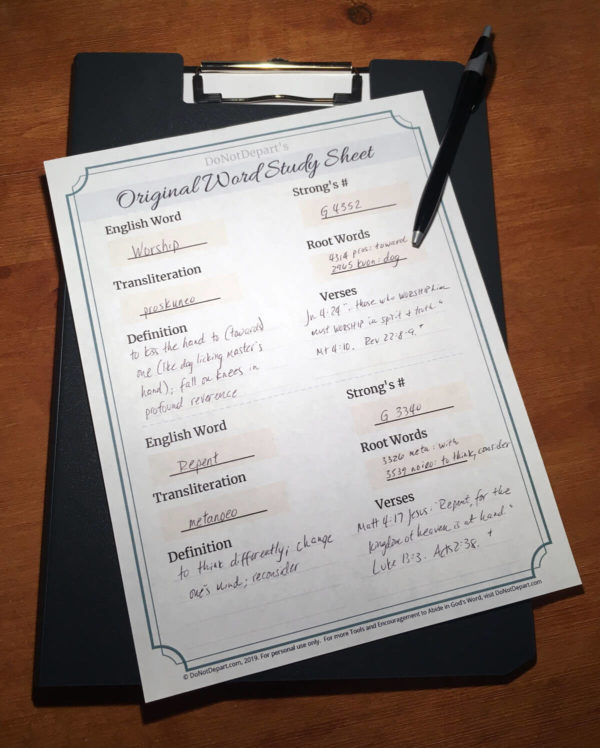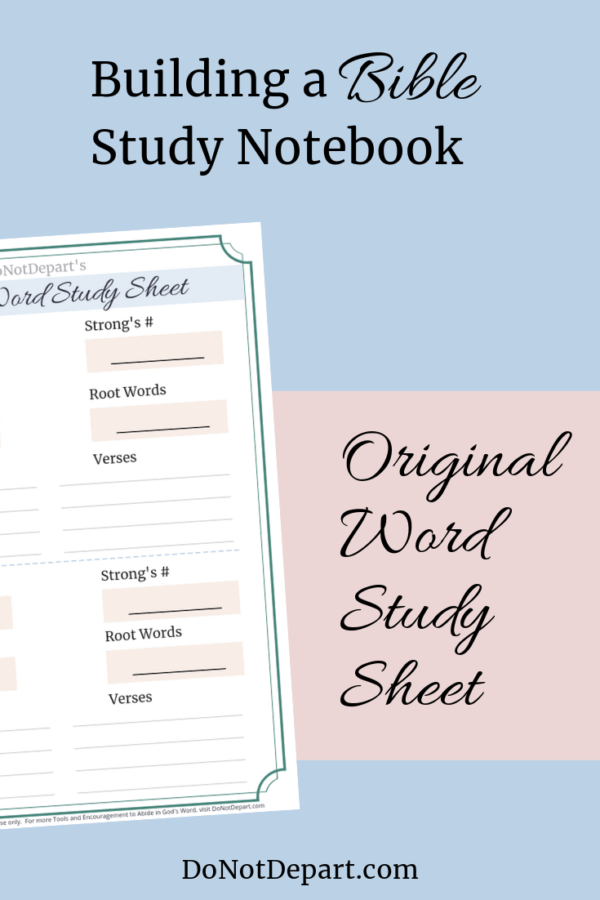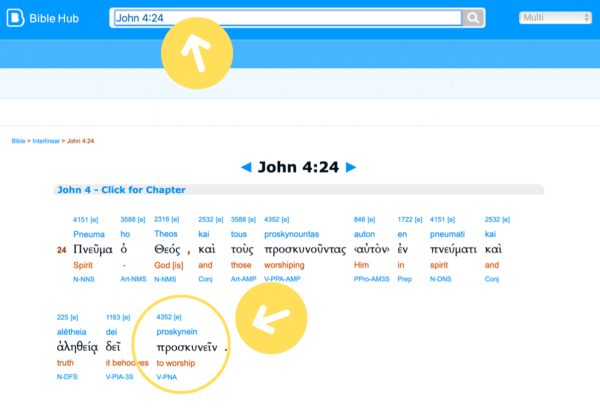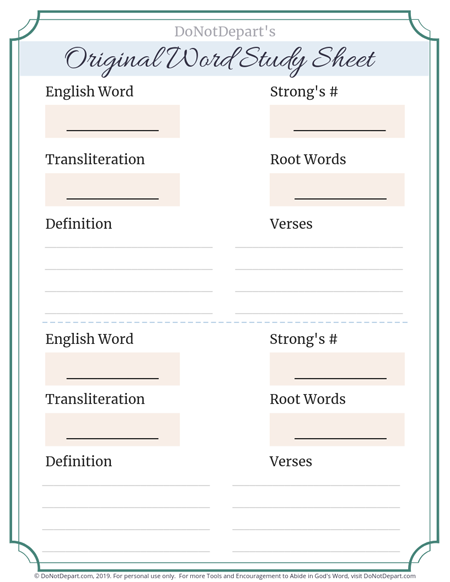Get your next free printable today to build your Bible notebook. It’s easier than you think to study Hebrew and Greek words. This sheet will help.
Deeper Meanings
“Think differently.”
Our behaviors follow when our thoughts change. “To think differently” is the literal meaning of the word “repent” [metanoeo] in the New Testament.
Did you know that?
Or this one? “To kiss the hand (like a dog licking his master’s hand)” is the definition of “worship” [proskuneo]. Think how loyal your family pet is to you. How much joy do we express when we’re near our Master?
We can learn the meanings underneath the words we read in our Bibles. It helps us think differently, worship more, and grow a deeper faith.
Use Hebrew and Greek
While it’s definitely NOT essential to know the original Biblical languages of Hebrew, Aramaic, and Greek to understand God’s grace, it can be helpful to look up words in the original languages when we want to learn more.
It can take less than 5 minutes to enrich your study of God’s truths.
And, more importantly, it can enhance your awareness of God’s love for you and increase your love for Him.
It doesn’t have to be all Greek to you.
It’s easy! Download this free study sheet. Then use it to study your own list of interesting words.
How to Study Original Words
1. Type in the word or verse you want to study.
Here are some online references that are easy to use.
- Bible Hub
- Bible Study Tools
- Blue Letter Bible
- e-Sword (downloadable software)
2. Write down the Strong’s number.
Old Testament words will begin with #H for Hebrew. New Testament words will begin with #G for Greek.
3. Fill in the blanks of the study sheet.
Write down as much or as little as you’d like: original root word, its derivations, definition, and any extra verses that interest you.
4. File in your Bible notebook.
It’s helpful to three-hole-punch your study sheet (along with extras). Keep them all together in one place in your Bible notebook.
You don’t have to delve into grammar, pronunciations, tenses, alphabets, etc. (Unless you want to! If you do, there are many resources online, in bookstores, and possibly your local church.)
An Example
To study “worship” in John 4:24, I used this online interlinear Bible at Bible Hub. I typed in the verse.
Then I clicked on the Greek word for worship, #G4352.
I filled out my worksheet.

Want more ideas to study?
Check out these series previously posted at Do Not Depart:
Your Original Word Study Sheets
Click here to download your own Original Word Study Sheets. You can study two words per page. Print as many pages as you’d like to put in your Bible notebook.
Get ALL the free Bible Notebook pages here. More are being added all month of August.
Do you like studying root words? Tell us your favorite resources, along with any questions or extra tips, in the comments below.




What an easy way to study the Bible in more depth, Lisa! Thanks for sharing with us today.
Blessings!
Hope this will be helpful, Martha. I’m so grateful for all the tools we have at our fingertips in this age!
Lisa, thank you so much for the handouts!
You’re welcome, Pam. Hope the handout will be useful. I’m loving this series about building a Bible notebook.
Lisa,
I’m truly a “word nerd”…I love to find out the root meaning of words in the Bible. I have the NIV Exhaustive Concordance with Greek/Hebrew dictionary/translation by verse. I find it fascinating to discover the different nuances of one word, when used in different scriptures. Thanks for the additional tips and the Word Study Guide! So glad I stopped by!
Blessings,
Bev xx
You’ve got a great resource, Bev! That sounds perfect for word nerds. :) I count myself in that camp, too. I’m glad we don’t have to fully know Hebrew or Greek to still benefit from it. I love peeking behind the curtain at these words.
This is a good idea for me. Often I will look up a word but I find that if I make the effort to write it down and consciously take note, it helps to ‘cement’ it in my brain. Thank you!
That’s me, too. If I don’t make an intentional effort to remember, it’s often forgotten. Thanks for visiting!
Cool links!
I still use my ancient Strong’s Exhaustive Concordance. It’s falling apart from decades of use, but I still love it. I’ve marked every word that I’ve looked up over the years, pretty interesting to see all the marks.
But you’re right, to see the words original definition gives a much deeper meaning and understanding and insights into the heart and intention of our Father.
I still pull out that big heavy concordance myself from time to time. It’s a hefty book! :) It was a lifesaver back in pre-internet days, but works just as good now, too. How cool that you marked the words so you can see your history of study. Wise man, Floyd. Thanks for sharing this here.
I have a rather large stack of books, 1st being the Strong’s concordance, and dictionary. Then a couple commentaries etc… I also love the Blue Letter Bible, the app is super convenient. Love this idea of building a study notebook. Many Thanks!
Sounds like you’re quite a wonderful Bible student, Debra Jean. I’m guessing you may be a teacher of the Word, too? I don’t have the app for the Blue Letter Bible but sounds like I might need to get it! Thanks for sharing.
Cool! I’ve always wondered how people who didn’t know Greek or Hebrew figured out the meanings of words :).
Ha. Now you’re on to us, Anita. :) My knowledge of Greek and Hebrew doesn’t go deep, but even a little bit can be quite enlightening.
Thanks so much Lisa!! I LOVE the tabs & word study sheet the most, but I love all the printables and all of these resources you’ve shared. I’m so excited to begin my journey to understanding God’s Word much deeper! ✝️❤️
I’m glad this is helpful to you, Nicole! May God continue to bless you on this journey with Him. It’s exciting!